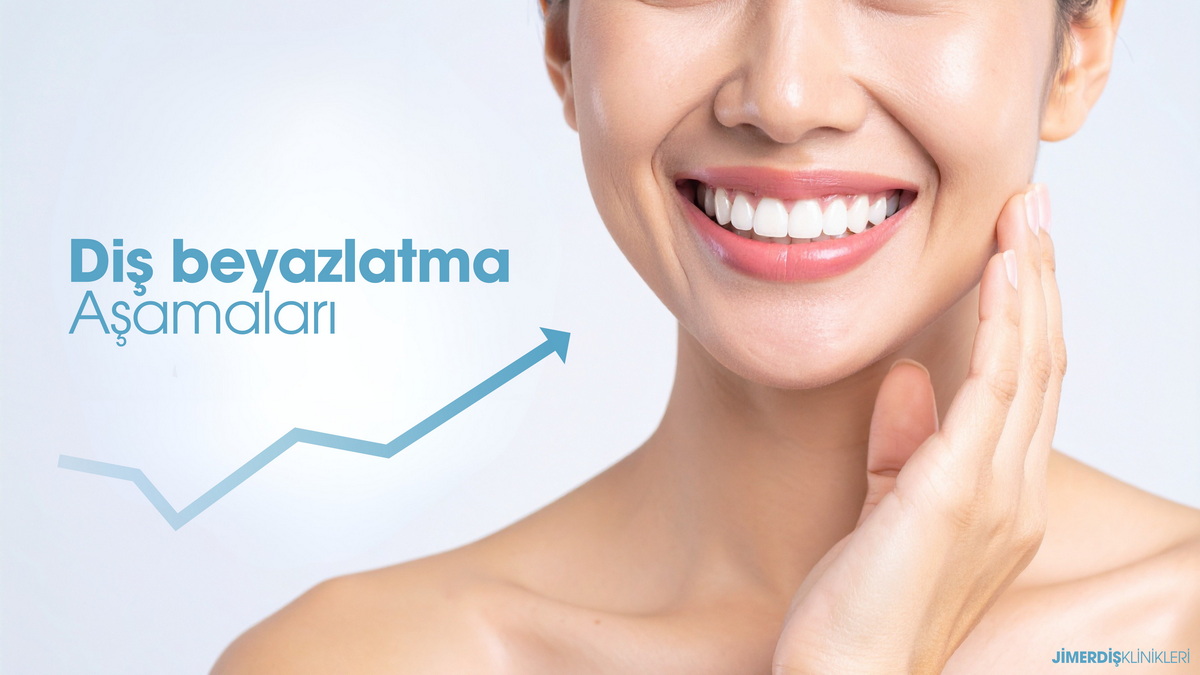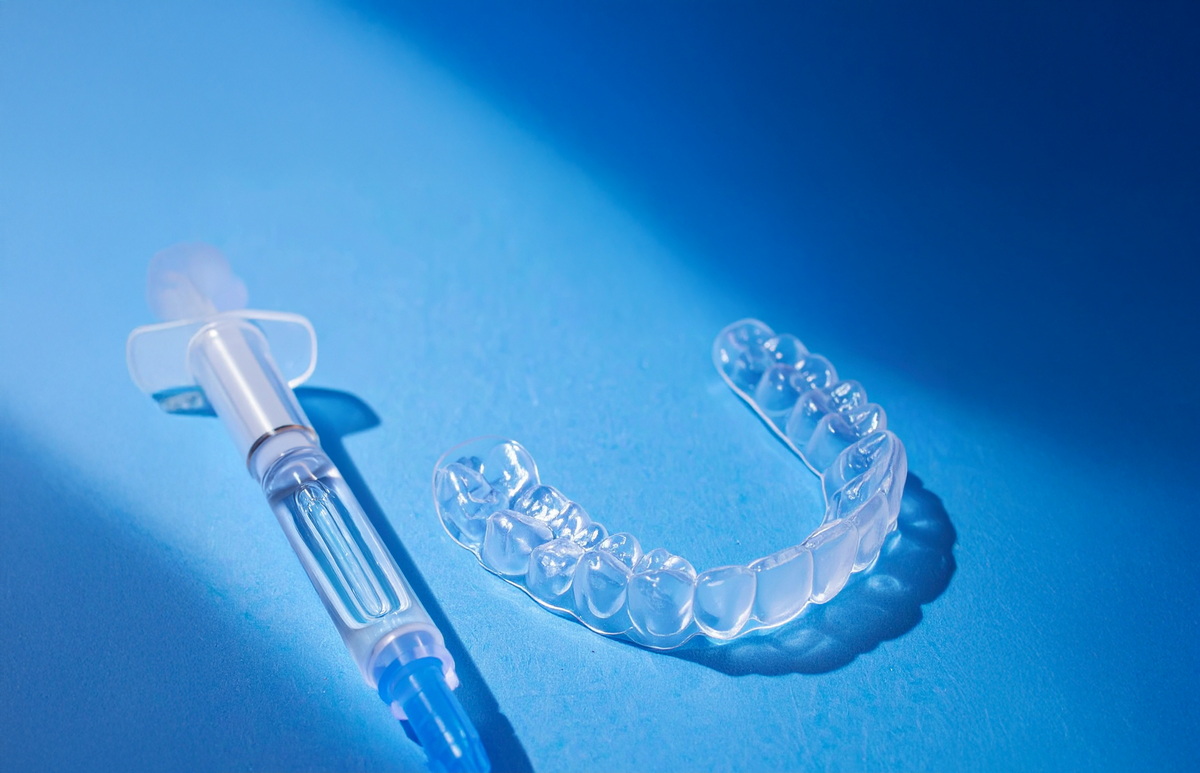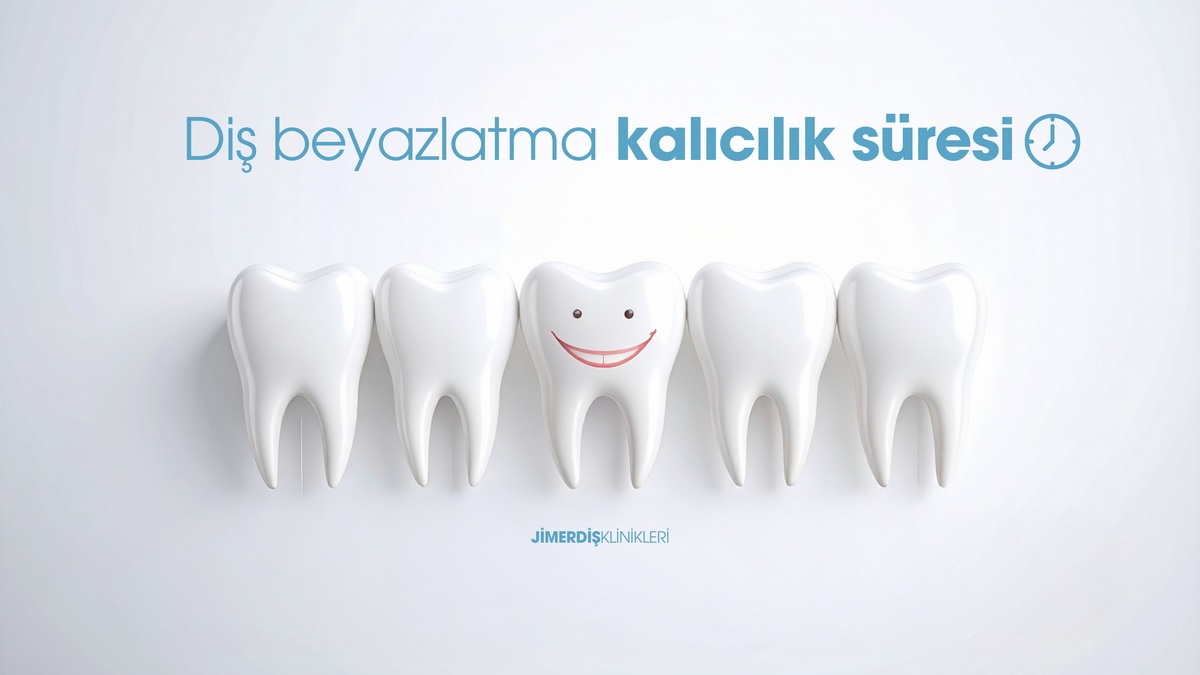Teeth Whitening
Over time, teeth can lose their natural whiteness due to various external factors. Habits such as coffee, tea, and smoking can cause discoloration on the surface of the teeth. Various whitening procedures are used to prevent this or reduce existing discoloration. To achieve permanent and safe results, a consultation with a dentist is essential.

-
What is Teeth Whitening?
Teeth whitening (Bleaching) refers to general procedures used to lighten the existing color of a person's teeth. It is a cosmetic procedure applied with special whitening gels containing hydrogen peroxide or carbamide peroxide. Teeth whitening procedures are divided into two categories: in-office and at-home.
-
In-Office Bleaching Laser-Assisted Whitening

In this method, dentist applies highly concentrated whitening gels to the teeth, which are then activated by laser or LED lights. It typically takes 30–60 minutes and provides rapid results in a single session. Teeth can be lightened by 2-3 shades in a single session. If you're looking for information about teeth whitening in Bursa, you can find information about the teeth whitening procedures we perform at Jimer Dental Clinics below. For more detailed information, please contact our team.

Jimer Dental Clinics Teeth Whitening Stages
- Preliminary Examination and Assessment: The dentist first checks the patient's dental and gum health. If there are any issues with teeth such as decay, sensitivity, or gum disease, these may need to be treated first. In this case, the necessary treatments are completed first, and then teeth whitening is performed.
- Teeth Cleaning-Scaling (If Necessary): Before the whitening process, any plaque or tartar present on the tooth surface is removed. This step allows the whitening gel to penetrate better. The patient's tooth color is then measured using a color chart, and the initial shade is determined.
- Protective Applications: A protective gel (gingival dam) is applied to the gums to prevent damage during the procedure. The patient is provided with goggles to protect their eyes from light.
- Whitening Gel Application: The tooth surfaces are coated with a special whitening gel.
- Light or Laser Application: In office-based whitening systems, special LED lights or laser devices are used to enhance the gel's effectiveness. The laser activates the hydrogen peroxide, providing rapid results and is completed in a single session.
- Removing the Gel and Evaluating the Results: After the procedure, the gel is removed and the achieved whiteness level is checked. The procedure can be repeated for 1-2 more sessions if necessary.
- Post-Procedure Care and Recommendations: It is recommended to avoid colored foods and beverages (tea, coffee, red wine, etc.) for 24-48 hours after the procedure. Additionally, desensitizing products recommended by your dentist can be used.
-
At-Home Bleaching

Home bleaching differs from office bleaching in terms of application. In office bleaching, teeth are whitened gradually with a single session, while at-home bleaching involves a quick and easy procedure. For at-home bleaching, the patient first comes to our clinic, takes oral impressions, and a custom clear tray is made. Whitening kits are provided, instructions are provided, and the patient then uses the tray and the at-home whitening kit. Depending on the desired results, the whitening process can be completed within 1-2 weeks. Effective results are typically achieved within 5-7 days of use.
Jimer Dental Clinics' Home Whitening Steps
- Preliminary Examination and Assessment: During the examination, the dentist first checks the teeth for suitability for whitening. Impressions are then taken for the clear trays, which will be custom-made for the patient.
- Scaling (If Necessary): Before the whitening procedure, if there is tartar or plaque buildup on the teeth, a tartar removal is performed to ensure the gel has a better effect on the tooth surfaces.
- Applying the Whitening Gel with the Tray: The dentist instructs the patient about the prepared clear tray and whitening gel, instructing them on how to use it. The dentist then places the whitening gel from the kit into the tray for at-home application.
- Achieving Desired Results: The trays, which come with the instructions, are applied by the patient. It is recommended that these trays be kept in the mouth for 5-6 hours. The trays are then cleaned and the teeth are brushed. The gel is reapplied to the trays as directed by the dentist, and the application is repeated for 1-2 weeks until the desired whiteness is achieved. Effective results are generally observed within 5-7 days. Once the desired results are achieved, the treatment is discontinued.
- Post-Procedure Care and Recommendations: Avoid colored foods and beverages (such as tea, coffee, red wine, etc.) during and for 24-48 hours after the teeth whitening procedure. Additionally, brushing and flossing should be continued to maintain the effects of the procedure for a long time.
-
Combined Whitening for Best Results:
For some patients, a combination of in-office and at-home whitening methods can be used, based on a dentist's evaluation. This combined teeth whitening procedure is highly effective for patients who want to lighten more stained and yellowed teeth and maintain their whiteness for a long time.
Especially for teeth with intense discoloration and deep stains:
- In-office whitening is performed in the clinic first, using a powerful gel and light.
- Then, at-home whitening is continued with custom trays.
The dentist will determine the most appropriate method for you during your consultation.
-
What are the Popular Brands Used in Teeth Whitening?
There are many professional teeth whitening gels and laser light devices available on the market today. Teeth whitening technologies can vary depending on the gel content, chemical composition, or light duration. At Jimer Dental Clinics, we choose FDA-approved brands with proven clinical success worldwide for the safety and satisfaction of our patients.
The most commonly used professional teeth whitening brands in dentistry are:
- Ultradent Opalescence™ Boost™: (Original from the USA) This cutting-edge system, with its highly concentrated hydrogen peroxide gel, delivers fast and effective results in a single session. It works solely through chemical activation without the use of light, reducing sensitivity.
- Fläsh: (Originally from Germany) This system is a modern LED light-assisted office-based whitening technology. Especially suitable for people with sensitive teeth, the Fläsh whitening system provides visible whitening results in a single session.
- Philips Zoom WhiteSpeed (Manufactured in the USA.) Activated with new LED light technology, this system delivers effective results in 45 minutes. It is one of the most widely used whitening systems by dentists worldwide.
Each of these brands offers solutions tailored to different needs. Your dentist will determine which system is right for you after a thorough examination.
-
Internal Whitening (Intracoronal Bleaching)
Internal tooth whitening is a specialized procedure performed on single or multiple teeth that have undergone root canal treatment and have changed color over time. Single-tooth whitening aims to match the color of teeth that are different in color compared to other teeth in the mouth and achieve an aesthetic appearance. This tooth whitening method is called internal bleaching, intracoronal bleaching, or non-vital bleaching in dentistry.
The loss of vitality in a tooth after root canal treatment can lead to gray or brown discoloration over time. This type of internal discoloration cannot be removed with tooth whitening methods alone. Instead, a specialized whitening method is required. Intra-crown bleaching is performed on teeth with intrinsic discoloration using special whitening agents placed in the inner part (pulp) of the tooth.
The procedure is usually performed in several sessions lasting 3–5 days. The whitening agent placed inside the tooth is changed between each session. This method is only suitable for non-vital teeth and those that have undergone root canal treatment. It is not suitable for healthy, vital teeth. The process is completed when the color of the tooth reaches a tone that is compatible with the other teeth.
-
Teeth Whitening and Smile Aesthetics
Many people have the misconception that teeth whitening will improve a smile, or they confuse the two with each other. Not every tooth discoloration problem can be resolved with teeth whitening. If there is only yellowing and superficial stains on the teeth, in-office or at-home teeth whitening methods combined with tartar removal can provide effective results and improve the tooth tone. However, if there are also aesthetic issues such as irregularities in tooth shape and form, surface cracks, old fillings, or gaps between teeth, whitening alone is not sufficient. Therefore, in such cases, it is necessary to seek cosmetic dentistry.
Smile design procedures performed in such cases include:
- Bonding (composite aesthetic fillings): These are used to correct minor deformities and gaps between teeth without damaging the natural structure of the tooth.
- Laminate Veneers (Leaf Porcelain): These are very thin leaf porcelain veneers applied to cover the front surface of the front teeth. They change both the color and shape of the teeth and enhance the smile line.
- Zirconium or porcelain crowns: These are preferred for more severe deformities and when durability is crucial.
These procedures provide not only aesthetic benefits but also a personalized smile design. If your teeth cannot achieve their ideal appearance with whitening alone, these methods should be considered. For more information, please visit our smile design page.
-
Things to Consider Before and After Teeth Whitening
Gum disease, cavities, or cracked fillings should be treated before teeth whitening, as these problems can cause pain and sensitivity during the whitening process. If plaque and tartar buildup are present, dental plaque removal should be performed to ensure the whitening gel can better affect the enamel during the procedure.
After teeth whitening, avoiding colored foods and following a white diet for the first 48 hours is crucial for long-lasting results. Extremely hot and cold foods should also be avoided, as they can cause sensitivity for the first two days. Additionally, smoking, tea, and coffee should be avoided. Patients should maintain oral hygiene after teeth whitening to ensure long-lasting results.
-
Teeth Whitening Retention Time

The effects of teeth whitening treatments can vary depending on the type of treatment and an individual's oral care habits. Generally, the whitening effect can last between 6 months and 2 years.
- With in-office teeth whitening treatments, the whiteness achieved can last an average of 6 months to 2 years.
- With at-home whitening systems (applied with custom trays), the longevity typically ranges from 1 to 1.5 years.
To maintain long-lasting whiteness, it's recommended to maintain regular oral hygiene after the treatment, avoid foods that contain pigments, and have repeat whitening sessions or maintenance tray applications as needed.
The longevity of teeth whitening can be shortened or extended depending on an individual's habits, such as smoking and coffee and tea consumption. Therefore, the longevity of teeth whitening varies from person to person.
-
Side Effects and Risks After Teeth Whitening
Teeth whitening, when performed by a qualified dentist in a clinical setting using professional bleaching gels and light-assisted devices, does not cause permanent damage to tooth enamel. When performed with proper technique, no serious side effects are expected after the procedure.
The most common side effect is temporary tooth sensitivity, which occurs in the first 24-48 hours after the procedure. This sensitivity is felt as a slight tingling, especially with hot and cold foods and drinks, and usually disappears on its own within a short time.
Another concern among the side effects of teeth whitening is tooth abrasion. However, the risk of tooth abrasion is quite low with professional treatments. The impact on the minerals on the tooth surface is minimal, and this effect is temporary. Therefore, it is crucial to have the procedure performed under the supervision of a dentist to protect your dental health.
Natural teeth whitening methods like baking soda and lemon mixture, gargling with apple cider vinegar, and brushing with strawberry puree are frequently recommended on social media. However, while these methods may provide a temporary cleaning effect in the short term, they can damage tooth enamel and lead to long-term problems such as sensitivity, erosion, and even yellowing. Trying these methods at home without consulting a dentist is not recommended. For permanent and healthy whitening, professional or clinically approved at-home whitening methods should be used under the supervision of a dentist.
There are many at-home teeth whitening products readily available online and in pharmacies today. However, some of these can cause further yellowing of teeth with continued use. While they may provide short-term and temporary effects, for permanent, safe whitening, it's essential to consult a dentist.
Teeth whitening procedures performed by dentists are extremely safe and do not harm teeth. You may experience some sensitivity in your teeth and gums when you first apply the treatment, but this is a temporary effect.
The whitening gel used for in-office whitening is more concentrated and powerful than at-home teeth whitening, providing fast and effective whitening in a single session. At-home whitening can also achieve good results, but because the gel is less concentrated, it provides gradual and slower whitening.
The procedure can be repeated within 1-2 years. To preserve the natural structure of the teeth, whitening should be done at shorter intervals. After one year, the procedure can be repeated if the dentist deems it appropriate.
There is no pain during the teeth whitening procedure. Because the whitening is applied to the enamel, the top layer of the tooth, there is generally no pain during the procedure. You may experience sensitivity for a day or two after the procedure, but this is completely temporary.
Teeth whitening procedures performed under the supervision of a dentist do not cause any harm to teeth.
Teeth can change color due to various factors. Factors that cause tooth discoloration include smoking, coffee and tea consumption, poor oral hygiene, dental trauma, and genetics.
Teeth whitening typically lasts 1-2 years. This period is longer for people who don't smoke or consume colorful foods.
After teeth whitening, you need to allow time for the enamel pores to close and reduce the risk of staining. Avoid coffee, cigarettes, tea, and colored foods for 48 hours.
The healthiest and safest teeth whitening method is the one performed by dentists.
Because teeth whitening in public hospitals is considered a cosmetic procedure, the Social Security Institution (SGK) does not cover it. Even if teeth whitening services are offered, patients must pay for the procedure.
For detailed information about our tartar removal fees, please contact us at +90 533 735 14 52.
Teeth whitening prices vary depending on whether tartar removal is required and whether the procedure is performed in-office or at-home. For more information about our teeth whitening costs, please contact us at +90 533 735 14 52.
After teeth whitening, it's recommended to avoid foods that impart a specific color. These include tea, coffee, red wine, chocolate, cherries, strawberries, cherry juice, beets, caramel, and tomato paste. Patients can consume these foods two days after the procedure.
In-office whitening is achieved in a single session on the same day, while at-home whitening takes 1-2 weeks.
Professional brands like Zoom White Speed and Fläsh, which are used by dentists, do not harm teeth. For laser teeth whitening, it's important to consult a dentist and have a quality gel and device from a high-quality brand used.
Teeth whitening is not recommended for people under the age of 18. Additionally, teeth whitening is not recommended for pregnant women or those allergic to the gels used.
Yes, a dental checkup is required before teeth whitening. Any dental problems should be addressed before the procedure.
There are many types of tooth discoloration. While good results can be achieved on teeth with ideal enamel thickness in brown and yellow tones, the same results may not be achieved on teeth with gray or thin enamel. Additional single-tooth whitening can also be performed on these teeth. Depending on the condition of your teeth, your dentist will determine the most appropriate teeth whitening treatment for you.
At Jimer Dental Clinics, located in Bursa's Nilüfer Parkora and Odunluk Jimer Hospital, we offer professional teeth whitening technology and expert dentists. If you're looking for a suitable clinic for teeth whitening, please contact our expert team to schedule an appointment.
Take advantage of our Teeth Whitening service now!
Complete the form to receive complimentary 5 star hotel, spa services, breakfast, and vip transfer.
 TR
TR DE
DE


